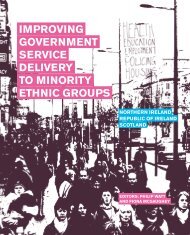4858 Mental Health Report - National University of Ireland, Galway
4858 Mental Health Report - National University of Ireland, Galway
4858 Mental Health Report - National University of Ireland, Galway
You also want an ePaper? Increase the reach of your titles
YUMPU automatically turns print PDFs into web optimized ePapers that Google loves.
Findings from the Investigation <strong>of</strong><br />
Cross-Border Collaborative <strong>Mental</strong> <strong>Health</strong><br />
Promotion Practices<br />
Post-natal depression is a significant public health problem experienced by 10-<br />
15% <strong>of</strong> mothers, which causes considerable distress to mothers, children, families<br />
and society. The distress caused by post-natal depression is <strong>of</strong>ten misunderstood<br />
both by the public and health care pr<strong>of</strong>essionals alike. It is therefore frequently<br />
hidden and suffered alone (O’Callaghan 2000). Although it is a common disorder,<br />
only half <strong>of</strong> those affected seek medical help (<strong>Health</strong> Promotion Unit 1998). Postnatal<br />
depression occurs at a time when contact with health care pr<strong>of</strong>essionals is<br />
at its peak. All interactions with mothers can be used more effectively for<br />
primary, secondary and tertiary prevention <strong>of</strong> post-natal depression (O’Callaghan<br />
2000).<br />
Research suggests that effective interventions can help prevent, detect and<br />
reduce the impact <strong>of</strong> post-natal depression. Prompt interventions may reduce the<br />
following adverse effects:<br />
• the unhappiness caused by post-natal depression.<br />
• the adverse effects on the child’s behavioural, emotional and cognitive<br />
development.<br />
• possible adverse effects on the parent’s relationship which may lead to family<br />
breakdown or divorce (O’Callaghan 2000).<br />
Following research by O’Callaghan (2000) on post-natal depression, a gap in<br />
service provision was identified at Louth County Hospital, Dundalk. To address<br />
this gap, a post-natal support service was set up to <strong>of</strong>fer information, assessment,<br />
screening and counselling to distressed mothers. It was felt that by extending this<br />
project to include the post-natal services in Northern <strong>Ireland</strong>, the service could be<br />
improved by the sharing <strong>of</strong> resources, ideas, information and best practice.<br />
Project Aims<br />
The aims <strong>of</strong> this project are:<br />
• To provide a cross-border multi-disciplinary service to develop greater<br />
awareness <strong>of</strong> post-natal depression.<br />
• For all disciplines to facilitate identification <strong>of</strong> mothers at risk <strong>of</strong> post-natal<br />
depression.<br />
• To <strong>of</strong>fer increased support, counselling and assistance to reduce the impact <strong>of</strong><br />
depression on the mother, the child and the family.<br />
Project Objectives<br />
The objectives set out to achieve these aims are:<br />
• Provision <strong>of</strong> a cross-border multi-disciplinary service on post-natal depression<br />
to reduce the adverse effects on mothers and families.<br />
• Mothers at risk will be identified and <strong>of</strong>fered increased support,<br />
counselling and medical assistance to reduce the incidence or impact<br />
<strong>of</strong> post-natal depression.<br />
39
















